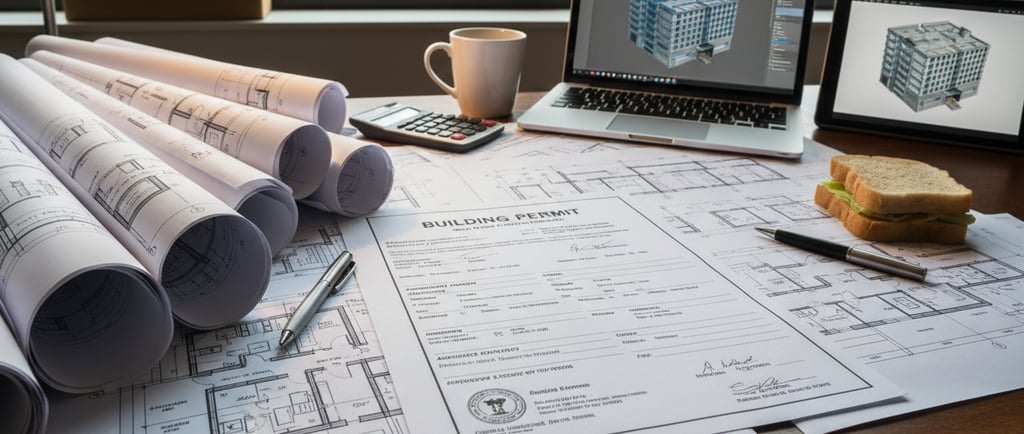Why building permits are important.
And why you might consider getting one for your next home improvement project.
11/2/20253 min read


Why building permits are important.
And why you might consider getting one for your next home improvement project.
Author: Matt L'Etoile | November 1, 2025
Most people are familiar with building permits. For those who aren’t, a building permit is essentially permission from the local government for the location in which you live that authorizes (or permits) certain types of residential construction projects. Projects such as renovations, additions, new construction, re-plumbing, and the installation of new electrical breaker panels require review and approval by your local government’s building inspector.
But, why does this matter and why might it be a good idea to get one?
First of all, there is a generally negative attitude toward building inspectors and building permits. The general consensus is that they take up time, they are expensive, and building inspectors tend to be sticklers. However, these are not always true.
Building permits can take time to secure, especially for large projects. This is because certain projects, especially those involving new construction or structural elements, require building plans stamped by an architect or engineer. Nevertheless, once the permit application is complete and submitted to the building department, it can sometimes take no more than a couple of days for approval. That is, assuming the plans are drawn well and you have a competent architect or engineer.
Building permits are not very expensive, either. That is, the permit itself is relatively inexpensive. In most cases, the permit fee is a small percentage of the overall project cost, sometimes in the neighborhood of 5 – 7%. If you are permitting a large project, sure, this could be somewhat expensive. But, the cost of not getting a permit can far exceed this, which I will discuss further below.
Finally, building inspectors are often reasonable, fair, and cooperative. While this can vary from town to town or city to city, building inspectors can be generally helpful and usually looking out for the best interest of the property owner. It is best to cooperate with your building inspector and be respectful and courteous. If you are up (or your contractor) is upfront with them about your project and make an honest effort to complete work in accordance with your local building code, a building inspector will see that and will make your life easy.
So, why is it a good idea to get a building permit?
First of all, it is the law. If it is discovered that you are performing work without a permit, or even if the work has already been completed, you can be forced to pay the permit fee, in addition to fines for failing to secure a permit before starting work. Furthermore, in some cases, a building inspector can actually make you undo work you have done to ensure that code has been met, which will result in additional material and labor costs. In severe conditions, a building inspector can actually deem your house unsafe, forcing you to leave until code deficiencies have been corrected.
Second, in order to obtain a certificate of occupancy after work has been completed, you will need a building permit. If you do not have a certificate of occupancy, or if work has not been permitted, and something happens (e.g. a fire, flood, injury, or damage due to work performed without a permit), it is possible that homeowners insurance may not cover the cost of the damage. This could even be the case years after the work has been completed. Needless to say, this would not be a good situation.
Third, obtaining a building permit and having inspections performed throughout the course of your project will add a bit of extra assurance that the work being done is safe, correct, and to code. While a building inspector may not identify all code violations, they are likely to identify major ones that threaten life and limb. Additionally, getting building plans provided by an engineer (1) provides assurance that any structural work performed is safe and sound (provided the plans are followed and (2) if anything were to happen even after following the plans, the engineer could be held liable, and the cost of damage might be paid out of the engineer’s professional liability insurance.
If you hire a contractor who is willing to secure a building permit, that’s a potential sign that the contractor is trustworthy and good at what they do. If your contractor is reluctant to get a building permit, or especially outright refuses, or even doesn’t broach the subject during initial conversations, that is a red flag. Being a professional contractor involves building permits.
If you have any home improvement projects you’d like completed, contact True Home Renovation & Repair. You’ll see why the majority of my clients are repeat clients. I do the work right the first time, and I make sure it lasts. Don’t gamble with your most valuable asset. Call True Home today.
Copyright 2025 - True Home Renovation & Repair, LLC. All rights reserved.
